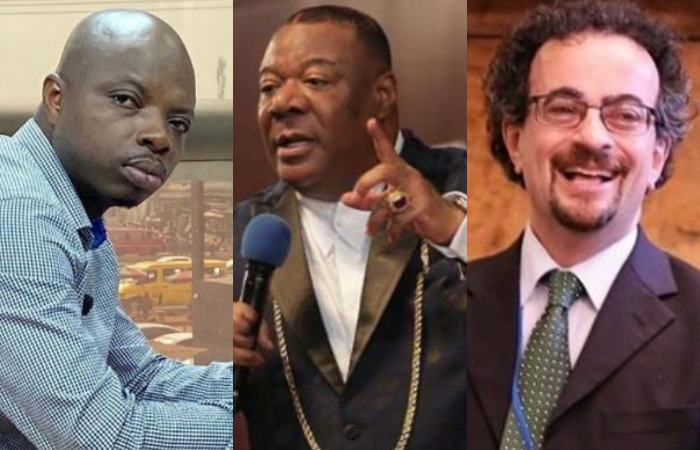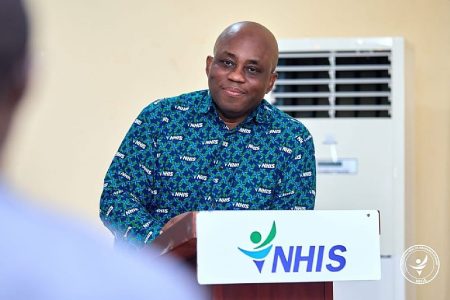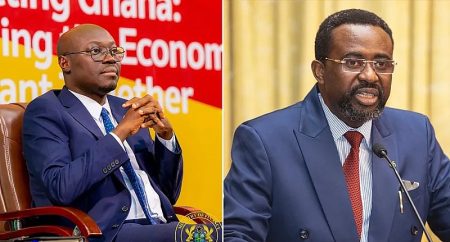Archbishop Nicholas Duncan-Williams, a towering figure in Ghanaian religious life and the founder of Action Chapel International, has issued a stern rebuke to Kwame Baffoe, also known as Abronye DC, the Bono Regional Chairman of the New Patriotic Party, and Jon Benjamin, the former British High Commissioner to Ghana, for what he deemed to be unwarranted and deeply disrespectful attacks against his person and ministry. The Archbishop’s response, delivered during an interview on Channel One TV, conveyed not only his disappointment with their conduct but also a grave warning about the potential consequences of such behavior. Drawing upon his extensive experience of nearly five decades in ministry, he emphasized that he had witnessed the eventual downfall of individuals who engaged in similar patterns of disparagement and character assassination.
The Archbishop’s comments came in response to a series of public attacks launched by both Abronye and Benjamin. Abronye, during an appearance on Ohia TV, accused the Archbishop of political bias and questioned his moral standing. This outburst drew swift condemnation from the NPP leadership, who distanced themselves from Abronye’s remarks, describing them as “unfortunate and unprovoked” and not reflective of the party’s values or official position. Simultaneously, Jon Benjamin, via social media, ridiculed the Archbishop following his address at the National Day of Prayer and Thanksgiving, accusing him of extravagant spending, including unsubstantiated claims about booking entire first-class cabins for family trips. This commentary was widely criticized as being culturally insensitive and disrespectful of a revered religious leader.
At the heart of the controversy was the Archbishop’s declaration during the National Day of Prayer and Thanksgiving, expressing his dream for a Ghana where citizens would travel abroad not out of economic desperation but for leisure and experiences like culinary tourism. This aspirational vision, seemingly innocuous, became the catalyst for the attacks, with Abronye and Benjamin interpreting it through their own lenses of political bias and perceived hypocrisy. The Archbishop, however, reframed the narrative in his response, emphasizing the importance of self-reflection before casting judgement on others. He stressed that while everyone is susceptible to flaws and shortcomings, it does not give anyone the right to publicly denigrate and humiliate others.
The Archbishop’s cautionary words resonate with a deeper message about the nature of public discourse and the responsibility that comes with wielding influence, whether political or diplomatic. He argued that criticism, while sometimes necessary, should be delivered with integrity and a degree of self-awareness, not with the intent to inflict personal injury or score political points. He underscored the hypocrisy inherent in judging others without acknowledging one’s own imperfections. His message serves as a reminder that public figures, especially those in positions of leadership, should be held to a higher standard of conduct, promoting respectful dialogue and refraining from engaging in personal attacks and baseless accusations.
The incident has ignited a broader public debate about the balance between freedom of speech and the respect due to religious leaders. In a society as diverse and complex as Ghana, where religious figures hold significant moral authority, the boundaries of acceptable criticism become a sensitive issue. While constructive criticism can be a valuable tool for accountability and growth, the Archbishop’s experience highlights the dangers of crossing the line into personal attacks and ridicule. The controversy underscores the need for a more nuanced understanding of public discourse, one that acknowledges the importance of respecting diverse viewpoints and refraining from inflammatory rhetoric.
This incident, involving a prominent religious leader, a political figure, and a former diplomat, serves as a microcosm of the challenges faced by many societies grappling with the evolving landscape of public communication in the digital age. The Archbishop’s response transcends the specifics of this individual case, offering a timeless wisdom about the importance of self-reflection, humility, and respectful engagement. His warning to Abronye and Benjamin is not merely a personal rebuke but a broader call for a more responsible and ethical approach to public discourse, one that prioritizes constructive dialogue over destructive criticism. He reminds us that words have power, and that with that power comes a responsibility to use them wisely and with consideration for the impact they have on individuals and society as a whole.














